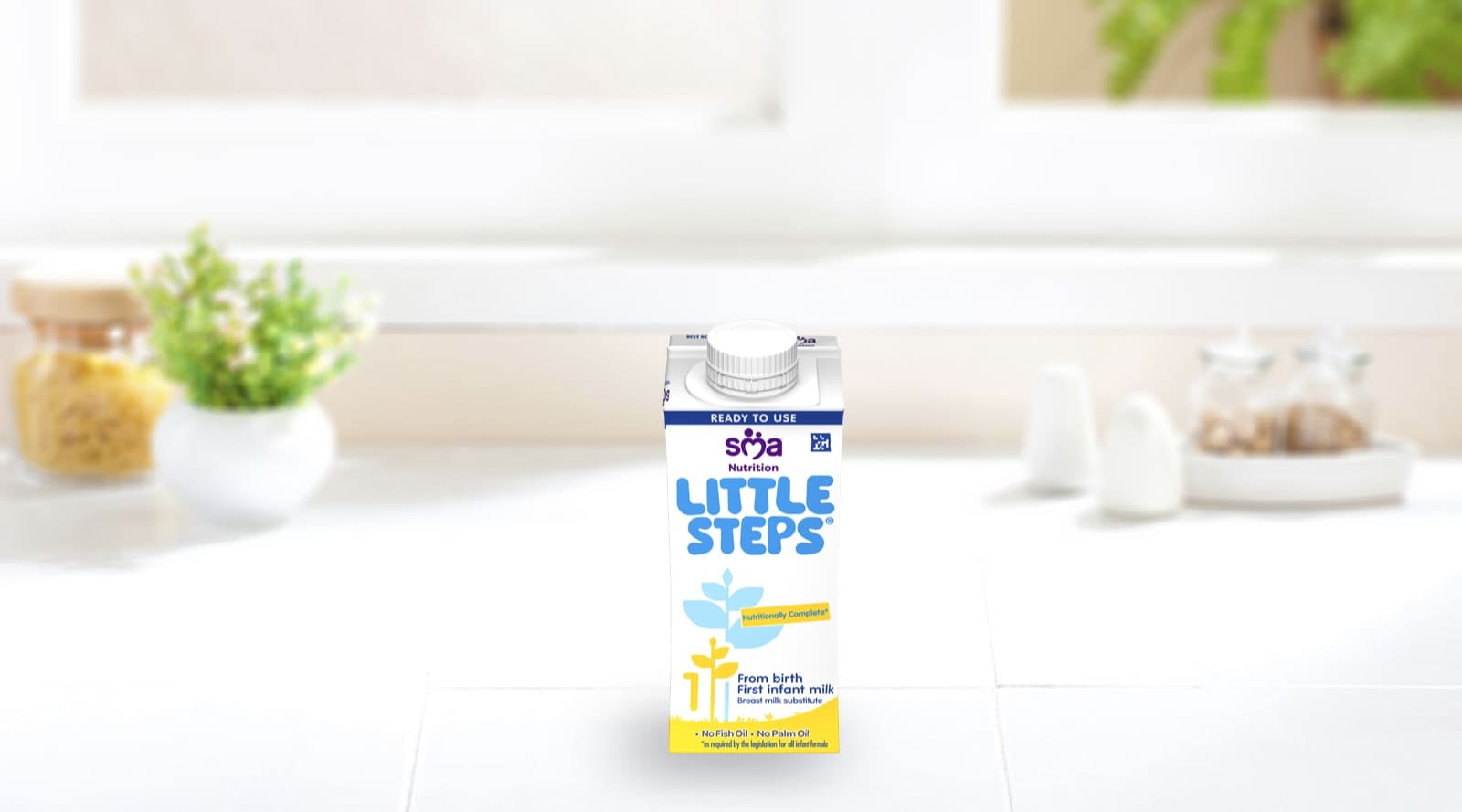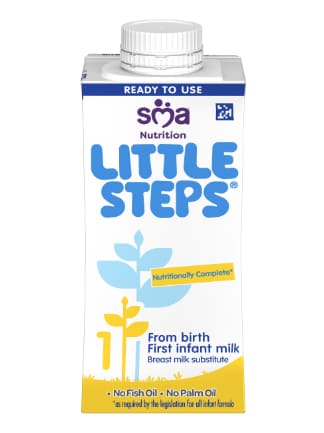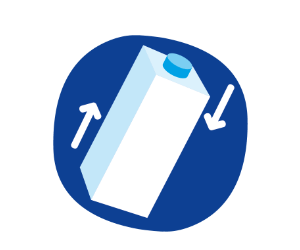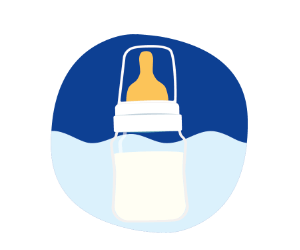From birth
LITTLE STEPS® First Infant Milk - Liquid
Breast milk substitute - suitable from birth (stage 1)
HERE FOR THE LITTLE STEPS ALONG THE WAY
Every little thing your child does is a sign of development, and it’s a true joy to experience together
Halal Certified
LITTLE STEPS® First Infant Milk is suitable from birth when baby is not breastfed. Breastfeeding provides the best start for your baby, but if you decide to combination feed or bottle-feed, LITTLE STEPS® First Infant Milk is nutritionally complete* and contains DHA* (Omega 3).
GOOD TO KNOW!
Babies who have 500 ml or more (about a pint) of LITTLE STEPS® First Infant Milk a day will not need additional Vitamin D supplements.
* As required by the legislation for all infant formula
Why LITTLE STEPS® First Infant Milk?
Formats
Also available in powder formats:
800 g Powder
Easy open lid. Scoop can be stored in suspension inside the can. Use product within 4 weeks. Approximately 177 scoops per can.
Preparing your baby's feed
Whilst this product is made under strict hygienic conditions, it is not sterile. Failure to follow instructions on preparation and storage may make your baby ill.
Feeding guide
Birth - 12 months
| Approx. age of baby | Approx. weight of baby | Size of feed | Feeds in 24 hrs |
|---|---|---|---|
|
|||
| kg | ml | ||
| Birth – 2 weeks | 3.4 | 100 | 6 |
| 2 – 4 weeks | 3.7 | 130 | 6 |
| 4 – 8 weeks | 4.2 | 130 | 6 |
| 2 months | 5.3 | 170 | 5 |
| 3 months | 6.1 | 200 | 5 |
| 4 months | 6.7 | 200 | 5 |
| 6 months | 7.6 | 250 | 4 |
| 7 – 12 months | - | 200 | 3 |
| Approx. age of baby | Approx. weight of baby | Size of feed | Feeds in 24 hrs | |
|---|---|---|---|---|
|
||||
| lb | fl. oz. | |||
| Birth – 2 weeks | 7½ | 3½ | 6 | |
| 2 – 4 weeks | 8 | 4½ | 6 | |
| 4 – 8 weeks | 9¼ | 4½ | 6 | |
| 2 months | 11¾ | 6 | 5 | |
| 3 months | 13½ | 7 | 5 | |
| 4 months | 14¾ | 7 | 5 | |
| 6 months | 16¾ | 8½ | 4 | |
| 7 – 12 months | - | 7 | 3 | |
This table is a guide only; your baby may need more or less than the volumes stated. If you require more advice, consult your healthcare professional. Remember to feed your baby on demand.
Important feeding information
-
Check best before date.
-
Once open, reseal carton and store only in the fridge (5℃ or below) for up to 24 hours.
-
For hygienic reasons, discard unfinished feed in the bottle as soon as possible, and always within 1 hour.
-
For older babies, ready to use formulae can be added to food.
-
Do not alter or add to formulae unless medically directed.
-
Do not warm feeds in a microwave, hot spots may occur and cause scalding.
-
Remember, cows' milk should not be used as a drink during the first year.
-
Do not freeze
| Nutrition information per 100 ml prepared feed |
||||
|---|---|---|---|---|
| Nutrition information | ||||
| Typical values | ||||
| Energy | 283 kJ 68 kcal | |||
| Fat | 3.2 g | |||
| of which, saturates | 0.3 g | |||
| of which, mono-unsaturates | 2.0 g | |||
| of which, polyunsaturates | 0.6 g | |||
| Omega 3 | ||||
| α-linolenic acid (ALA) | 41 mg | |||
| Docosahexaenoic acid (DHA) | 16.9 mg | |||
| Omega 6 | ||||
| Linoleic acid (LA) | 465 mg | |||
| Arachidonic Acid (AA) | 16.9 g | |||
| Carbohydrate | 8.3 g | |||
| of which, sugars | 8.3 g | |||
| of which, lactose | 8.3 g | |||
| Protein | 1.5 g | |||
| Nutrition information per 100 ml prepared feed |
|
|---|---|
| Vitamins | |
| Typical values | |
| Vitamins | |
| Vitamin A | 54 µg |
| Vitamin D | 1.5 µg |
| Vitamin E | 1.6 mg |
| Vitamin K | 4.6 µg |
| Vitamin C | 10 mg |
| Thiamin | 0.06 mg |
| Riboflavin | 0.2 mg |
| Niacin | 0.5 mg |
| Vitamin B6 | 0.04 mg |
| Folate | 18 µg |
| Vitamin B12 | 0.2 µg |
| Biotin | 1.6 µg |
| Pantothenic Acid | 0.5 mg |
| Nutrition information per 100 ml prepared feed |
|
|---|---|
| Minerals | |
| Typical values | |
| Minerals | |
| Sodium | 22 mg |
| Potassium | 96 mg |
| Chloride | 51 mg |
| Calcium | 45 mg |
| Phosphorus | 28 mg |
| Magnesium | 5.7 mg |
| Iron | 0.61 mg |
| Zinc | 0.52 mg |
| Copper | 0.06 mg |
| Manganese | 17.45 µg |
| Fluoride | ≤0.01 mg |
| Selenium | 3.4 µg |
| Iodine | 13 µg |
| Nutrition information per 100 ml prepared feed |
|
|---|---|
| Others | |
| Typical values | |
| Others | |
| Choline | 21.2 mg |
| Inositol | 8 mg |
| L-Carnitine | 1.2 mg |
Ingredients
Water, skimmed MILK, demineralized whey (from MILK), lactose (MILK), vegetable oils (sunflower, rapeseed), potassium citrate, emulsifier (SOYA lecithin), calcium citrate, oil from Mortierella alpina (AA), oil from the microalgae Schizochytrium sp.(DHA), potassium chloride, calcium chloride, choline bitartrate, vitamin C, magnesium citrate, sodium chloride, ferrous sulphate, antioxidants (tocopherol-rich extract, ascorbyl palmitate), zinc sulphate, vitamin E, niacin, pantothenic acid, copper sulphate, vitamin A, thiamin, vitamin B6, manganese sulphate, potassium iodide, folic acid, sodium selenate, vitamin K, vitamin D, biotin, vitamin B12.
Your Baby's next stage
-
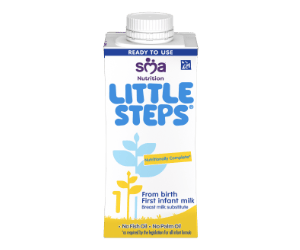
Stage1
You are here
-
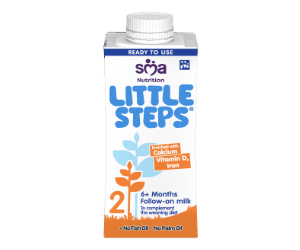
Stage 2
LITTLE STEPS® Follow-on Milk
To complement the weaning diet, suitable from 6 months +
Important notice
We believe that breastfeeding is the ideal nutritional start for babies and we fully support the World Health Organization’s recommendation of exclusive breastfeeding for the first six months of life followed by the introduction of adequate nutritious complementary foods along with continued breastfeeding up to two years of age. We also recognise that breastfeeding is not always an option for parents. We recommend that you speak to your healthcare professional about how to feed your baby and seek advice on when to introduce complementary feeding. If you choose not to breastfeed, please remember that such a decision can be difficult to reverse and has social and financial implications. Introducing partial bottle-feeding will reduce the supply of breast milk. Infant formula should always be prepared, used and stored as instructed on the label in order to avoid risks to a baby’s health.






